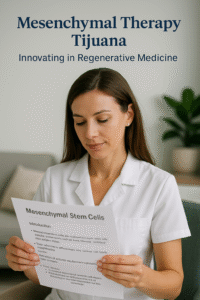Mesenchymal stem cells Treatment (MSCs) are transforming the landscape of regenerative medicine. These versatile cells, with the ability to differentiate into various types of tissue, are unlocking new possibilities for treating conditions once thought untreatable. From osteoarthritis to neurological disorders like Alzheimer’s and Parkinson’s, Mesenchymal Stem Cells are leading a revolution in medical treatment. Sourced from accessible tissues like bone marrow and adipose, Mesenchymal Stem Cells offer a safer and more flexible option for regenerative therapies, with their low risk of rejection making them a powerful tool for allogeneic transplantation.
Mesenchymal Stem Cells Treatment: A Change in Regenerative Therapy
The Regenerative Therapy on Mesenchymal Stem Cells Treatment is an innovative approach to repairing or replacing damaged tissues and organs, harnessing the body’s healing capabilities. This field has gained remarkable traction over the past few decades, primarily driven by advancements in stem cell research. Unlike traditional medical treatments that often focus on symptom relief, regenerative therapy seeks to address the underlying causes of diseases or injuries by promoting the regeneration of healthy cells. This approach has the potential to revolutionize the way we treat a variety of conditions, from degenerative diseases to traumatic injuries.
Central to the concept of regenerative therapy is the use of stem cells, which have the unique ability to differentiate into various cell types, thereby facilitating tissue repair. These cells can be sourced from different tissues, including embryonic, adult, and even induced pluripotent stem cells. Among these, mesenchymal stem cells (MSCs) stand out due to their accessibility, low risk of rejection, and versatility. Mesenchymal Stem Cells Therapy can be isolated from bone marrow and adipose tissue sources, making them an appealing candidate for various therapeutic applications.
The implications of regenerative therapy extend beyond mere treatment; they encompass the potential for improved quality of life and longevity. Conditions that were once deemed untreatable, such as severe osteoarthritis or spinal cord injuries, could see significant advancements thanks to regenerative therapies. With ongoing research and clinical trials, the horizon appears promising, paving the way for novel treatments that might soon redefine our approach to medicine.
The Unique Properties of Mesenchymal Stem Cells Therapy
Mesenchymal Stem Cells Treatment possess remarkable properties that set them apart from other stem cell types. One of their most significant features is their ability to differentiate into various cell lineages, including osteoblasts, chondrocytes, and adipocytes. This multipotency allows Mesenchymal Stem Cells Treatment to contribute to the regeneration of different tissues, making them invaluable in regenerative medicine. Their ability to adapt and transform into the required cell type depending on the surrounding environment is critical to their therapeutic potential.
Another defining characteristic of Mesenchymal Stem Cells Treatment is their immunomodulatory properties. Unlike other stem cells, MSCs can evade the host’s immune response, significantly reducing the likelihood of rejection when used in allogeneic transplantation. This unique feature makes them an attractive option for cell-based therapies, as they can be sourced from healthy donors and administered to patients without extensive immunosuppressive treatments. The immunomodulatory effects of Mesenchymal Stem Cells Treatment also play a pivotal role in reducing inflammation and promoting healing in damaged tissues.
Also, Mesenchymal Stem Cells Treatment can secrete various bioactive molecules, including growth factors, cytokines, and extracellular matrix components. These secreted factors are crucial for modulating local cellular environments, promoting survival, and enhancing the proliferation and differentiation of neighboring cells. The paracrine signaling capabilities of Mesenchymal Stem Cells Therapy contribute significantly to their therapeutic effects, allowing them to effectively facilitate tissue regeneration and repair processes.
Applications of Mesenchymal Stem Cells
The versatility of The Future of Mesenchymal Stem Cells in Regenerative Medicinehas opened the door to many applications in regenerative therapy. Their ability to differentiate into various cell types and their immunomodulatory properties make them suitable for treating multiple conditions. One of the most promising applications is treating musculoskeletal disorders, where MSCs repair and regenerate damaged cartilage, bone, and connective tissues. This has significant implications for conditions like osteoarthritis, where traditional treatments often provide limited relief.
In addition to orthopedic applications, MSCs show great promise in treating autoimmune diseases. Their immunomodulatory properties allow them to interact with the immune system, helping to rebalance immune responses that are dysregulated in conditions like rheumatoid arthritis, lupus, and multiple sclerosis. By administering MSCs, there is potential to reduce inflammation and promote healing in affected tissues, offering a new avenue for patients who rely on long-term immunosuppressive therapies.
Furthermore, Mesenchymal Stem Cells Therapy are being investigated for their applications in cardiovascular diseases. The regenerative potential of these cells can be harnessed to repair damaged heart tissue following ischemic events, such as heart attacks. By promoting angiogenesis and reducing tissue scarring, MSCs could help restore cardiac function and improve outcomes for patients suffering from heart disease. As research continues to explore these applications, it is evident that MSCs hold substantial promise in diverse therapeutic contexts.
Treatment of Orthopedic Conditions
Orthopedic conditions, such as osteoarthritis and cartilage injuries, represent a significant area of focus for MSC therapy. Osteoarthritis, characterized by cartilage degeneration and the underlying bone, affects millions globally, leading to pain, stiffness, and reduced mobility. Traditional treatment options often involve pain management or invasive surgical procedures, but the use of MSCs offers a regenerative alternative.
Studies have shown that MSCs can be effectively injected into affected joints, where they can differentiate into chondrocytes, the cells responsible for producing cartilage. This differentiation helps repair damaged cartilage and promotes the release of anti-inflammatory factors that can alleviate pain and improve joint function. Clinical trials have demonstrated positive outcomes in patients receiving MSC injections, with reports of reduced pain and enhanced mobility, suggesting that MSC therapy could become a standard treatment option for osteoarthritis.
Moreover, MSCs can also play a role in treating fractures and other bone-related injuries. Their ability to differentiate into osteoblasts, the cells that form new bone, is crucial in the healing process. When combined with biomaterials or scaffolds, MSCs can enhance bone regeneration, speeding up recovery times and improving overall healing outcomes. This application mainly benefits complex fractures or conditions like non-unions, where standard healing processes are insufficient. As research progresses, it is anticipated that MSCs will become an integral part of orthopedic treatment protocols, offering patients a less invasive and more effective solution.
Treatment of Autoimmune Diseases
Autoimmune diseases present a unique challenge in medical treatment, involving the immune system mistakenly attacking the body’s tissues. Conditions such as rheumatoid arthritis, lupus, and multiple sclerosis often require long-term management strategies that can be burdensome for patients. The immunomodulatory properties of MSCs offer a promising avenue for therapeutic intervention. By modulating the immune response, MSCs can reduce inflammation and promote tissue repair in affected areas.
Research has shown that MSCs can alter the function of immune cells, thereby inhibiting the inflammatory processes characteristic of autoimmune diseases. For instance, in rheumatoid arthritis, MSCs can help reduce the activity of pro-inflammatory cytokines and promote the generation of anti-inflammatory factors. This dual action not only helps alleviate symptoms but may also slow down disease progression. Clinical trials involving MSC administration in autoimmune patients have shown promising results, with participants experiencing reduced disease activity and improved quality of life.
Furthermore, the ability to source MSCs from the patient’s body (autologous MSCs) minimizes the risks associated with immune rejection. This personalized approach can enhance treatment efficacy and safety. As more studies are conducted, the potential for MSC therapy in managing autoimmune diseases continues to expand, indicating a shift towards more regenerative and less disruptive treatment options for patients suffering from these challenging conditions.
Treatment of Cardiovascular Diseases
Cardiovascular diseases remain one of the leading causes of morbidity and mortality worldwide, prompting significant interest in innovative treatment strategies. MSCs have emerged as a potential therapeutic agent due to their regenerative capabilities and ability to promote healing in cardiac tissues. Following a heart attack, the heart suffers damage that can lead to heart failure if not adequately addressed. MSC therapy aims to repair this damage and restore heart function.
One of the critical mechanisms by which MSCs exert their effects is through the secretion of paracrine factors that promote angiogenesis and the formation of new blood vessels. This is crucial in restoring blood flow to damaged areas of the heart, ensuring that the tissues receive the necessary nutrients and oxygen for recovery. Also, MSCs can help reduce fibrosis, a common consequence of heart injury, improving overall cardiac function. Clinical trials have shown promising outcomes, with patients receiving MSC therapy experiencing improved heart function and quality of life.
Moreover, MSC therapy can be combined with other treatment modalities, such as scaffold technology, to enhance effectiveness. By incorporating MSCs into biomaterials, researchers aim to create an optimal environment that supports cell survival and promotes tissue integration. This approach not only accelerates healing but also holds the potential to improve long-term outcomes for patients with cardiovascular diseases. As research in this area continues to evolve, the role of MSCs in cardiovascular therapy is likely to expand, offering hope to those affected by heart-related conditions.
Current Research and Clinical Trials Involving
The field of MSC research is rapidly evolving, with numerous studies and clinical trials underway to explore the full potential of these versatile cells. Researchers are investigating various aspects, including optimal sources of MSCs, best methods for administration, and the efficacy of MSCs in diverse therapeutic contexts. Current clinical trials target a range of conditions, from orthopedic injuries to complex systemic diseases, aiming to evaluate the safety and effectiveness of MSC therapies.
One of the focal points of ongoing research is the improvement of MSC isolation and expansion techniques. Scientists are exploring ways to enhance the yield and quality of MSCs from different sources, such as bone marrow, adipose tissue, and even umbilical cord blood. These advancements could lead to more efficient therapeutic applications, allowing larger quantities of high-quality MSCs to be produced for clinical use. Furthermore, researchers are investigating the potential of genetically modifying MSCs to enhance their therapeutic properties, thereby improving their effectiveness in treating specific conditions.
Additionally, clinical trials are examining the long-term effects of MSC therapy. Understanding how long the beneficial effects of MSC treatments last and the mechanisms behind them is crucial for optimizing treatment protocols. As more data becomes available, it will guide the development of standardized treatment guidelines and improve patient outcomes. The ongoing research and clinical trials surrounding MSCs highlight their potential in regenerative medicine and point towards a future where these therapies could become commonplace in clinical practice.
Challenges and Limitations of Using Mesenchymal Stem Cells
Despite the promising potential of Mesenchymal Stem Cells in regenerative therapy, several challenges and limitations remain. One significant concern is the heterogeneity of Mesenchymal Stem Cell populations, which can result in inconsistent therapeutic outcomes. Different sources of MSCs may exhibit varying properties, impacting their effectiveness in specific applications. This variability necessitates rigorous characterization and standardization of MSCs before being widely adopted in clinical settings.
Another challenge lies in understanding the long-term safety and efficacy of Mesenchymal Stem Cells therapy. While short-term results from clinical trials are encouraging, comprehensive studies are needed to evaluate the potential risks associated with MSC administration, including tumor formation and immune responses. Longitudinal studies will be essential to ascertain the durability of therapeutic effects and any delayed adverse outcomes that could arise from Mesenchymal Stem Cells Treatment.
Furthermore, regulatory hurdles present a significant barrier to the widespread use of Mesenchymal Stem Cells therapy. The approval process for new regenerative treatments can be lengthy and complex, often requiring extensive data on safety and efficacy. As the field of regenerative medicine continues to evolve, regulatory agencies must adapt and provide clear guidelines that facilitate the development and approval of Mesenchymal Stem Cells based therapies. Addressing these challenges will be essential for unlocking the full potential of Mesenchymal Stem Cells Treatment in regenerative medicine.
The Future of Mesenchymal Stem Cells in Regenerative Medicine
The future of mesenchymal stem cells in regenerative medicine appears bright and full of potential. As research advances, we expect more refined techniques for isolating and expanding Mesenchymal Stem Cells, leading to improved therapeutic outcomes. Innovations in genetic engineering may also enhance the properties of Mesenchymal Stem Cells , making them even more effective in treating a more comprehensive array of conditions. This ongoing evolution holds promise for developing next-generation therapies that are both safer and more effective.
Moreover, integrating Mesenchymal Stem Cells Therapy with other treatment modalities, such as gene therapy and tissue engineering, could amplify its potential in regenerative medicine. Combining these approaches may offer synergistic benefits, allowing for comprehensive treatment strategies that address the symptoms and underlying causes of various diseases. This multi-faceted approach could redefine how we manage chronic conditions and improve patient outcomes significantly.
As the landscape of regenerative medicine continues to evolve, public awareness and acceptance of Mesenchymal Stem Cells therapy will be crucial for their successful implementation. Continued education about the benefits and risks associated with Mesenchymal Stem Cells treatment will help foster a supportive environment for research and development. Ultimately, the future of Mesenchymal Stem Cells in regenerative medicine holds immense promise, with the potential to change the lives of countless individuals facing challenging health conditions.



